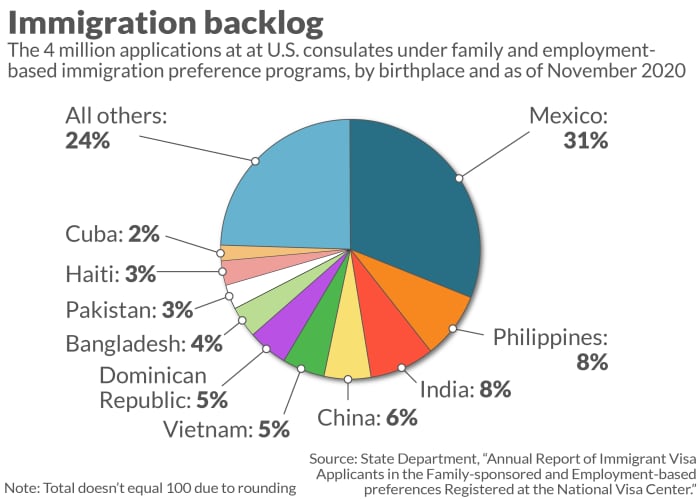This post was originally published on this site
The United States is facing a historic labor shortage. Throughout the summer, more than 10 million jobs were unfilled—the most ever and well over double the historical average. The shortage is causing businesses to reduce hours, close, raise prices and reduce services.
Americans are losing out, but there is a straightforward solution: legal immigrants.
At the very moment that job openings reached their unprecedented highs, the backlog of qualified immigrants waiting for legal permanent residence in the U.S. established its own record: over 9 million—with most of them waiting in other countries. Nearly all of these immigrants are qualified for legal permanent residence, can pass a background check and have a family member or employer to sponsor them. If they don’t die in line, they will almost all make it here… eventually.
The problem is that they are being forced to wait by either administrative processing delays or a lack of space under the annual legal immigration caps.
The processing delays are the fault of outdated bureaucratic systems—such as a paper-only filing system and a ban on web-based interviewing—as well as incomprehensible pandemic protocols keeping most U.S. consulates at reduced capacity.
But the bigger issue is that Congress has capped the number of family and employer-sponsored immigrants at very low levels, which were last updated more than three decades ago in 1990. These caps for family– and employer-sponsored immigrants are just 366,000 for an entire year. There were more than 30 times as many job openings in a single month in 2021 alone.
This 30-year pause on cap increases makes no sense. The U.S. economy has more than doubled since 1990, and the country has added about 35 million more households. The family and employment-based immigration limits should have at least adjusted to keep up, but they haven’t, and because of the administrative delays, the government is actually wasting tens of thousands of the few cap slots this year too.
“These caps for family– and employer-sponsored immigrants are just 366,000 for an entire year. ”
The solution is simple: Congress should eliminate arbitrary caps on qualified legal immigrants during times when the labor market clearly needs workers. It should require the executive branch to adopt streamlined procedures for processing these applications and ensure that the workers can make it into the country in time to meet employers’ needs.
The stakes are high. Every week that these jobs remain open is costing the U.S. economy, consumers, and businesses tens of billions of dollars in lost productivity. Prices continue to rise, and families are suffering. In some sectors—like healthcare—the shortage is literally a matter of life and death. One estimate found that alleviating the shortage would save thousands of lives per year.
Indeed, the 9 million backlogged immigrants mainly just need the government to create cap space, so that they can acquire their green cards, get jobs and contribute to the economy. Since the government can create more cap space with one or two lines in a bill, it can easily solve the backlog and let immigrants into the country.

For immigrants who have already approved petitions by sponsors and who are awaiting visa processing outside the United States — four million people, according to government data — nearly a third are Mexicans who could easily reach the United States tomorrow if visas were available. (Detailed data on the 3.2 million with petitions pending and the 1.8 million who have applied as immediate relatives of U.S. citizens or have applied in the U.S. is not available.)
Immigrants fill jobs, but they also create jobs for others. Because they tend to work in sectors where U.S. workers are less likely to want jobs, immigrants increase demand for U.S. workers in complementary positions. As immigrants move in, U.S. workers move up: from employee to supervisor, from brick layer to foreman, from back-of-the-kitchen to restaurant manager.
Now is the time to change the law and address the growing wait times. If Congress fails to act, hundreds of thousands of these immigrants will die waiting for the chance. But right now, an acute labor shortage exists, and legal immigrants stand ready to solve it. America should let them, thank them and get our economy back on track.
David J. Bier is a research fellow with a focus on immigration at the Cato Institute, a libertarian think tank in Washington, D.C.

